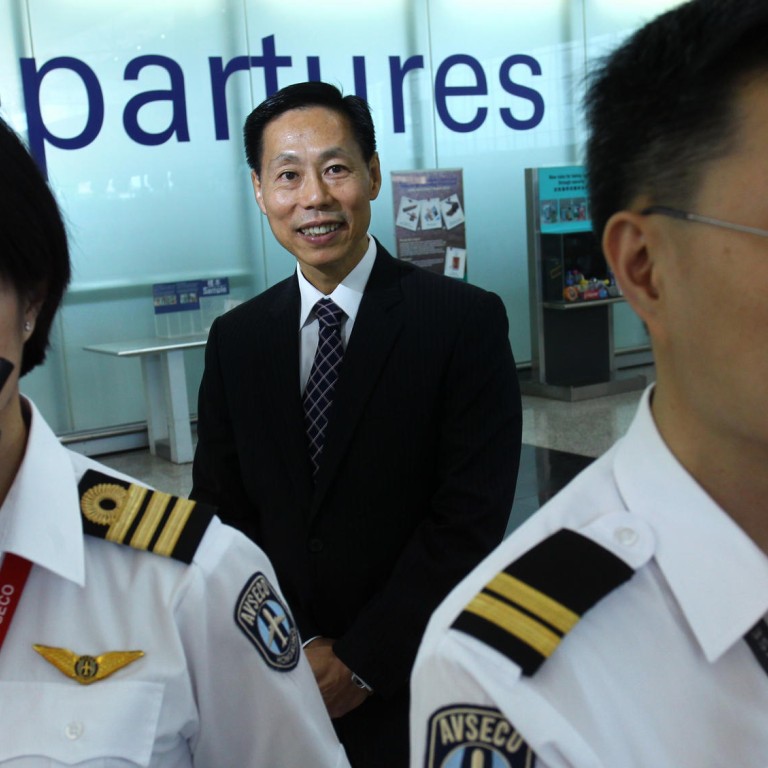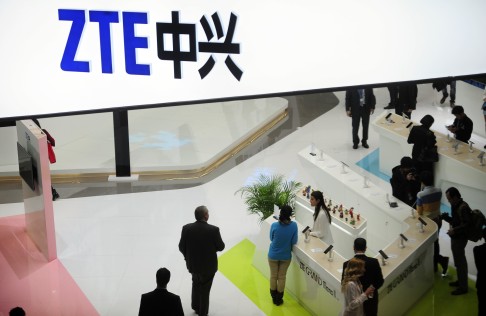
In first year, airport security chief Raymond Lau stresses staff morale
In his first year as head of Avseco, Raymond Lau has put worker morale and operational transparency at the top of his agenda
The new airport security chief says he has introduced sweeping changes to the workplace intended to make a job guarding one of the world's biggest airports an attractive career path.
A year after taking over as executive director of the Aviation Security Company (Avseco), Raymond Lau Chi-keung says he hopes the changes will boost staff retention as manpower demands increase.
Lau had to pick up the pieces after former chief Sidney Chau Foo-cheong's shock firing last August. Chau was arrested by graft-busters over accusations he improperly claimed HK$760,000 in overtime pay.
As well as protecting the safety of more than 60 million passengers, Lau's priorities in his first year have included lifting staff morale and rebuilding confidence in the company.
"Because Sidney had been at Avseco for a long, long time, I had some worries at the beginning that his departure might have some effect on the morale," Lau said of his predecessor, to whom he was deputy.
"But our team is quite good, they are professional … and they continued with their work."
Lau, who joined Avseco in 2010 after retiring from the police, said his leadership style was "slightly different" from that of Chau, who was known for keeping a close eye on his staff.
"Because there was a leadership change, staff did have expectations," he said. "I have been introducing a lot of changes that they could not enjoy in the past."
Lau now faces the challenge of building a workforce ready for a future in which passenger numbers are expected to grow to 100 million by 2030 with the proposed addition of a third runway.
Lau's six-year plan focuses on creating a clear career path. Select officers are chosen for a two-year management training scheme, education subsidies are available to all staff, and better promotion opportunities are on offer as Lau wants to hire fewer retirees from the disciplined services for managerial roles.
He also lifted a ban on mobile phones, allowing staff to use them during meal breaks.
"At the start there were some problems and people were abusing it, but it's a positive policy," he said. "Some of the older staff who don't use mobile phones say the policy is excellent because the younger staff really appreciate it."

Another area that has been tightened up in light of Chau's arrest is overtime. Assistant executive directors and above cannot now claim overtime, while staff at manager level and above get time off in lieu.
"If I need to claim overtime, I cannot because that is my duty," Lau said.
He is overhauling internal policies and working with the Independent Commission Against Corruption to ensure Avseco is seen to be clean.
"We needed to improve our corporate governance to bring the confidence back, so we've tightened up the policies and liaised closely with the ICAC," Lau said. "We want to show everybody - the public and the clients - that we are transparent."
And what of Chau, of whom little has been heard since the arrest?
"It was so sudden and even he had no idea why this happened as he was away at a conference and it occurred on the day he returned," Lau said, adding that he had not spoken to his former police colleague since.
"He was supposed to finish in January [next year] as he would be 65, so I had figured we would continue to work together until then," he said.
Lau monitors terrorism across the world to keep HK airport safe
The militant Islamic State hints at terror attacks in Asia; Muslim separatists carry out deadly strikes in mainland cities. Every day, it seems, a new terrorist danger appears in the headlines.
But for Raymond Lau Chi-keung, assessing security threats is second nature. His 31-year police career - including six years as assistant commissioner for security - has proved "useful" in his new role as airport security chief. As head of the Aviation Security Company (Avseco), the body set up to keep one of the world's busiest airports safe, Lau says reducing the risk of a terrorist attack is a constant task.
"The police are responsible for the intelligence and the threat assessment, and obviously we have to upgrade the security arrangement [in response]," Lau said. "But apart from waiting for this reactive intelligence coming in, we are quite proactive."
Every day, Avesco staff monitored the latest potential threats from around the world, Lau said.
"We watch all the news about terrorist attacks and airport incidents worldwide," he said. "If there's anything happening, we will study it and see if this can happen in Hong Kong."
Lau learned much from his experiences as police security chief when Hong Kong held the equestrian events for the 2008 Beijing Olympics.
Days before the events began, terrorist attacks in the restive Xinjiang autonomous region prompted calls to raise the risk assessment in Hong Kong, which was rated moderate at the time.
"In fact, I was in the centre of it. I assessed each and every [piece of] intelligence, and I didn't think it would affect us and that's why I didn't raise the level of the threat," Lau recalled. "I remember at the time, the police commissioner said: 'You are responsible'."
Lau also headed the police's VIP protect programme.
